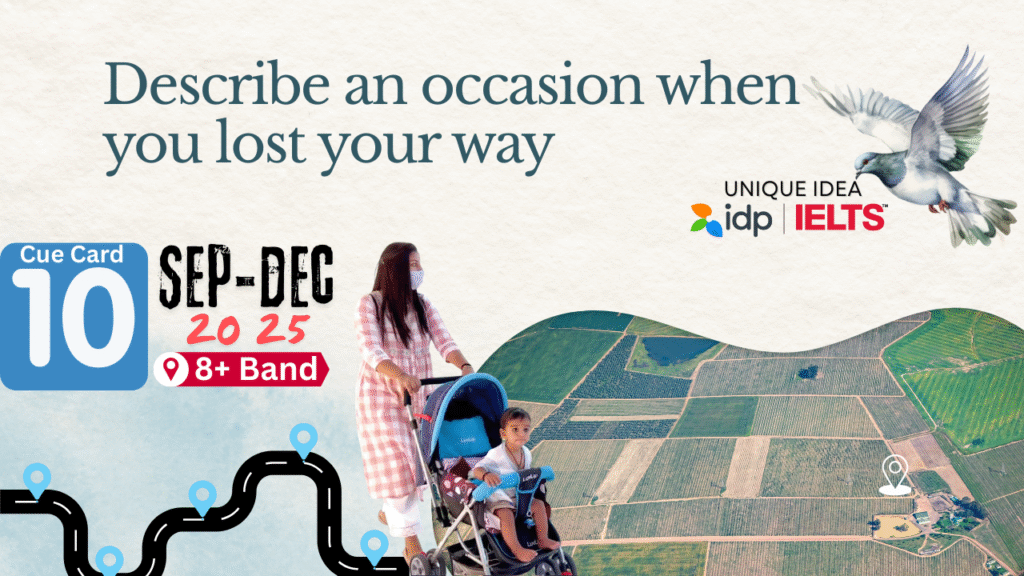•Where you were
•What happened
•How you felt
•And explain how you found your way
Vocab/Idioms
1. Crystal clear → Very easy to understand
2. Exhausted → Very tired
3. Unfortunately → Sadly / Regrettably
4. Heart sank → Felt very disappointed or worried
5. Unfamiliar → Not known / Strange
6. Fish out of water → Feeling uncomfortable in a new place or situation
7. Tight spot → A difficult situation
8. Sigh of relief → A deep breath when stress or worry goes away
9. Top of the world → Extremely happy
10. Vanished like thin air → Disappeared suddenly
11. Walking on thin ice → Taking a risky action
12. Spatial skills → Ability to understand space, directions, and shapes
Well, getting lost is something that almost everyone faces at least once in their life. To be honest, I am not a person with a very sharp sense of direction, so I often find myself in such situations. One particular incident that is still crystal clear in my memory happened when I attended my friend’s wedding in Chandigarh.
To begin with, I had never been to that city before, so I decided to travel by bus, thinking it would be the easiest option. The journey took almost four hours, and by the time I arrived, I was already exhausted. After that, I hired a cab and showed the driver the address my friend had sent me.
Unfortunately, because of some road construction, vehicles were not allowed to go further, and the driver told me to walk from there. At that moment, my heart sank because the surroundings looked unfamiliar, and I felt like a fish out of water.
Moving further, I tried to ask a few passers-by, but surprisingly, no one knew the exact location. I also tried calling my friend, but her phone was switched off, which left me in a tight spot. As the evening was setting in, I became even more anxious. However, instead of panicking, I decided to trust myself and find the way. After roaming around for a while, I noticed a wedding tent with colourful lights and loud music. To my great relief, it turned out to be the right venue.
Finally, when I saw my friend’s family, I breathed a sigh of relief or I felt so relieved, and all my stress vanished like thin air. Honestly speaking, in that moment, I felt on top of the world. Looking back, I realised that travelling without clear directions is like walking on thin ice, but this experience taught me to be more patient and confident in new places.
So overall, although it was stressful at that time, now it feels like a memorable adventure and a story I can laugh about.
Follow-ups
1. How do people feel when they get lost?
Well, generally speaking, when people lose their way, the first reaction is usually frustration and confusion. Sometimes, they may also feel fear, especially if they end up in a completely unknown place. Overall, it is not a pleasant feeling for most people.
2. Are some people better at orienting themselves?
Yes, absolutely, some people are better at finding their way than others. It usually depends on their experience and environment. People with good spatial skills can imagine maps in their mind, and some can remember places even after visiting once.
3. Are young people more reliant on their phones than older people to find their way?
Of course, young people today are more dependent on smartphones and GPS apps like Google Maps. On the other hand, older people may still prefer traditional ways, such as asking strangers for directions or using paper maps. This is mainly because they are not always as comfortable with modern technology.
4. Are young people gradually losing their ability to orient themselves?
To some extent, yes. Frankly speaking, over-reliance on GPS weakens natural navigation skills. For example, when someone always follows digital instructions, they stop practicing how to observe their surroundings or build mental maps.
5. With mobile phones and navigation apps, is it difficult for people to get lost?
Well, it’s less likely, but not impossible. On the one hand, phones make traveling easier. On the other hand, problems arise if the battery dies, the signal is weak, or the GPS gives wrong directions. Sometimes, people also follow maps blindly without thinking, which can still make them lost.
6. What kind of problems do older people face when they get lost?
First of all, older people may face physical limitations such as fatigue or difficulty walking long distances. Moreover, they often find it challenging to use digital tools for help. On top of that, with age, memory and cognitive skills may decline, which makes it harder for them to recall places or directions.
7. Some people like to walk around without navigation. Is there any problem?
Well, not always. On the positive side, exploring without a map helps people improve their sense of direction and enjoy surprises. However, the problem arises if the area is unsafe or too unfamiliar. In that case, one might feel stuck with no way back. So, in my view, it’s fine as long as people are careful.
8. How can people find their way when they are lost?
In my opinion, the first step is to stay calm. After that, people should observe their surroundings and look for landmarks or signs. If possible, they can ask locals for help or retrace their steps. Usually, once reaching a more crowded area, it is easier to find resources like shops or stations for guidance.
9. Do you think it is important to do some preparation before you travel to new places?
Yes, definitely. As far as I believe, preparation saves you from a lot of trouble. For instance, learning a bit about the area or downloading offline maps can be really useful. It’s also wise to keep emergency contacts handy in case your phone is lost. In short, a little preparation goes a long way.
10.Do you think it is important to be able to read a map?
Of course. Map-reading is one of the most basic but valuable skills in life. It becomes especially useful when technology fails or when people are hiking or traveling abroad. In fact, knowing how to read a map gives the ‘big picture’ of a place, which GPS sometimes doesn’t.
11. Is a paper map still necessary?
Well, in today’s digital age, paper maps are not used as much. However, they still serve as a useful backup. One advantage is that they never run out of battery and can be used anywhere. That’s why many experienced travellers still carry them, especially when visiting remote areas with poor internet connection.
12.Why do some people get lost more easily than others?
I think it mainly depends on awareness and memory. Some people don’t notice landmarks, while others have poor spatial skills. In addition, those who always rely on others for directions often struggle when they are on their own.
13. How do people react when they get lost?
In my opinion, reactions vary from person to person. Some people panic or feel stressed, while others stay calm and try to find a solution. Interestingly, a few even take it lightly and treat it as part of the adventure.



